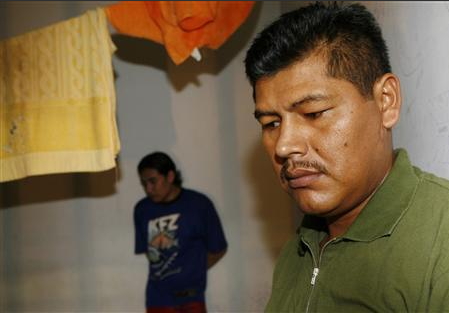
(above) Bolivian street vendor Bigmar Arancibia gives an interview inside a jail in the city of Corumba on the border with Bolivia January 14, 2009. Photo: REUTERS/Jamil Bittar
Brazil struggles with human drug train from Bolivia
March 2, 2009 - Reuters
By Raymond Colitt
CORUMBA, Brazil (Reuters) - Bolivian street vendor Bigmar Arancibia says he became desperate as business went so bad that he could no longer feed his wife and children. Now he sits in jail in this Brazilian border town and probably won't see them for years.
Police caught him with 3.5 kg (7 pounds) of coca paste in his bag as he apparently followed thousands of drug runners on a well-worn route from the highlands of South America's poorest country to the cities of Brazil, its much wealthier neighbor.
"I didn't have enough money to live," Arancibia, 33, sobbed while crouched in the heat of a crowded cell in Corumba.
He claims a friend put the drugs in his bag before he left his home town of Santa Cruz to buy merchandise in Corumba, but police say they find the story unlikely.
Poverty drives the drug runners to take terrible risks. Some women stuff baseball-sized packages in their vaginas, and others swallow capsules packed with cocaine. One woman spent 30 days in a hospital to expel 98 capsules she swallowed.
"It's a human train of contraband. Corumba is one of Brazil's main ports of entry for drugs and arms," said Inspector Mario Nomoto of Brazil's Federal Police.
Drugs smuggled through here fuel violence in Brazilian cities like Rio de Janeiro and addiction in Madrid or London.
Brazilian authorities now fear an increase in drugs from Bolivia after it banned the U.S. Drug Enforcement Administration (DEA) last year for allegedly spying on the government and supporting opposition leaders. Washington had been spending $25 million a year to fight drugs in Bolivia.
"We're concerned. The DEA provided resources, intelligence, logistics -- their departure is not good," said Paulo Tarso, head of counter-narcotics with the Federal Police in Brasilia.
Brazil's leftist President Luiz Inacio Lula da Silva flew to Corumba in January to offer Bolivia helicopters to combat trafficking in a sign of his government's concern.
BOLIVIAN COCAINE HITS BRAZIL
Officials say cocaine trafficking had already risen sharply since President Evo Morales, a former coca farmer, took office in 2006 with a policy of tolerating the cultivation of coca leaves for traditional use.
Bolivia's estimated cocaine production grew to 104 tons in 2007 from 80 tons in 2005, according to the United Nations Office on Drugs and Crime, or UNODC.
"The flow from Bolivia has increased. Some producer countries need to step up the fight, like Colombia did," said the Federal Police's Tarso. Unlike Bolivia, Colombia is one of Washington's biggest regional allies and a major aid recipient.
Roughly 80 tons of cocaine enter Brazil each year, much of it from Bolivia, and about half is re-exported to Europe and the United States, according to police and the UNODC.
Bolivia has pledged to finance the war on drugs out of its own pocket but is also seeking non-U.S., international help.
From clandestine labs in Bolivia to Sao Paulo wholesalers, drugs change hands 3-4 times, police say. Along the same smuggling routes from Bolivia and Paraguay, drug gangs bring in guns to defend their illegal trade. Many of the weapons end up with gangs in cities like Rio de Janeiro, where they battle police and rival traffickers.
Brazil has made some progress in recent years in cracking down on border trafficking, bombing clandestine landing strips and trails used by traffickers, and improving intelligence. It confiscated more than 16 tons of cocaine in 2007.
In Corumba, police often arrest smugglers at the bus station, acting on informants' reports of suspect passengers who buy return tickets as soon as they arrive.
But the controls are insufficient.
MORE CONTROLS NOT ENOUGH
On a 420-km (260-mile) drive from Corumba to Mato Grosso do Sul state capital Campo Grande, Reuters journalists saw vehicles pass unchecked at three police control points.
In Corumba, a bustling frontier town surrounded by lush vegetation, commerce and mining thrive. But leading businesses are also fronts for money-laundering, while some authorities take bribes for turning a blind eye, police say.
"This was built with drug money," one officer said, pointing at one of the city's largest buildings.
Most experts agree it is impossible for Brazil to control its 9,000 km (5,600 miles) of border with its cocaine-producing neighbors - Colombia, Peru, and Bolivia, as well as Paraguay, another major transit country for drugs and contraband.
Traffickers constantly change routes and strategies. After Brazil began shooting down suspect planes in 2004, traffickers abandoned long-haul flights to Sao Paulo state for shorter routes across the border that are harder to intercept.
They also diversified their risks by shipping smaller quantities of drugs with more people, police say.
"The drug war has failed. We need to move from a purely repressive approach to reducing consumption," said Fernando Henrique Cardoso, a former Brazilian president who this month co-authored a report on drugs with Cesar Gaviria and Ernesto Zedillo, the former presidents of Colombia and Mexico.
They want more help for addicts and a gradual legalization of drugs, beginning with the less harmful marijuana.
Back in Corumba, inspector Nomoto says border patrols are the second-best option for now but useless in the long-run.
"This is not a police but a social problem, we are treading water here."
(Editing by Kieran Murray and Alan Elsner)